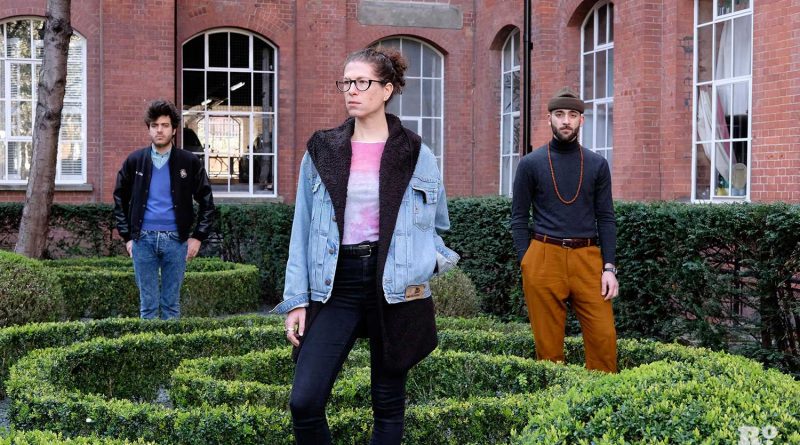Indigo Face channel the spirit of Bow Quarter
Bow based pop band Indigo Face are the new hot property in the old Bow match factory. The trio has been based in Bow Quarter for three years, honing their craft and drawing inspiration from East London life. In the wake of their new single, “A Womxn Will Save Us All”, we talk with the group about East vs West, feminine energy, and the magic properties of Muxima cake.
Indigo Face has always been an East London band at heart; moving here felt like coming home. Originally from France and Italy, Mariachiara Terragin, Max Obadia, and Andrea Rapisarda met during their studies in Fulham, but moved to Bow as soon as they graduated. They were drawn to the youth and energy of East London life, and when they found Bow Quarter it felt like a perfect match.
It’s a fitting base. In what used to be the Bryant and May factory, Matchgirl strikes and statues stained red with blood have given way to Manhattan style apartments, but the building’s activist history lives on in the band’s music.
Like most of Indigo Face’s songs, “A Womxn Will Save Us All” is up front about its meaning. ‘The song is about feminine energy more than the female,’ says lead singer and lyricist Terragin. Its jazzy, dark, ambient vibe is as cool as it is haunting, a suffragette anthem for the 21st century.
Bow has been a constant source of inspiration for the band. ‘The people you see in East London when you have a walk, you’re more likely to see inspiring people, people who are expressing themselves, not conforming to society’s rules,’ says Terragin. ‘As an artist maybe you don’t think about it actively, but you observe it and have it at the back of your mind. East London is a place that feeds you.’
Terragin is from the Veneto region of Italy. As you might expect from a lyricist, she measures her words as she talks, each sentence coming out just so. When the point is made she says, ‘That’s it,’ like a song ending. The care that goes into her work is clear.
Obadia is the group’s guitarist and his thoughts roll out melodically. A Parisian, Obadia also produces the group’s music. He reclines comfortably in his seat as we talk, framed by the mixing desk behind him. We are sat in the band’s studio, a sound-proof box built inside their flat. It’s a cosy, comfortable setup, a space to live as well as work. Honorary studio cat Gaspard – cut from Garfield cloth – spends most of the time curled up on Obadia’s lap.
The overwhelming impression is one of ease. Although the group was always drawn to East London, they were taken aback by how quickly they settled down.
‘It’s everyone in the same plate,’ says Obadia. ‘I really like that.’
‘There is a feeling of neighbourhood. That’s key. We are Europeans and in Europe we find more this kind of thing in villages or cities where we all help out each other. When we arrived in London, although we’re from different countries we were a bit shocked by the fact that although there’s so many people in London it’s so easy to feel lonely and lost.’
‘That was the thing. When we were west and visiting the streets of east London it was always the same magic, the same smell, the same sellers, so you establish contact with people. And now, it’s stupid, but going to Nisa or the post office or Muxima or the vegetable shop, the smile, the wink you give, this complicity, is key.’
Terragin thinks this is a product of common experience, something which is sometimes harder to find out West. ‘I’m not sure if we’re more open,’ she says. ‘Probably we just share the same struggles and dreams, so we find each other more easily here.
‘That’s what’s special about Roman Road. I’m not sure people have the same sorts of relationships in Shoreditch for example, but here that’s the beauty of it. There’s a strong sense of community.’
Muxima is a particular favourite of the band’s, a haven of sorts. ‘We feel at home when we’re there, it’s our little safe space. We do all our band meetings there,’ says Terragin. Obadia (half) jokingly credits the cafe’s cake for their creative purple patch since moving to Bow.
In truth Indigo Face seems like a group wired to thrive in the open, expressive tempo of East London life. From cafe owners to stall vendors to fellow artists, there is a shared experience that underlines everything.
‘I like the fact that these different levels all live together and it doesn’t feel like some people are pushed away,’ says Terragin. ‘It still hasn’t really happened here and hopefully it won’t.’


